A dramatic drop in the number of Covid-19 tests being carried out in Turkey is masking the true scale of the disease’s spread as the country prepares to open up for tourists next month, health experts said.
From a record high of more than 63,000 cases a day in mid-April, the number of registered infections fell to fewer than 25,000 on Monday.
Turkey entered its strictest lockdown of the pandemic four days earlier, with President Recep Tayyip Erdogan specifying that the daily rate must be brought below 5,000 to salvage this summer’s tourism season.
But the falling case numbers are accompanied by a corresponding drop in testing – from a peak of more than 322,000 on April 20 to fewer than 242,000 on Tuesday.
Health Minister Fahrettin Koca sought to soothe concerns about the test numbers. “A decline in contact between people is generally expected because of restrictions,” he said on Monday. “Consequently, the number of people going to clinics and the number of tests conducted by tracing teams are declining.”
But doctors disputed his statement. “Fahrettin Koca’s opinion is false,” said Vedat Bulut, general secretary of the Turkish Medical Association.
“The implementation of testing is limited. Just six months ago, when you were in contact with a Covid-19 case you had the right to a PCR test. But now, if you have contact with a family member or workmate who had Covid-19 and you ask for a test they say no because you need symptoms to be tested. “We know 80 per cent of people infected by this disease are asymptomatic.”
A March update by the US government’s Centres for Disease Control and Prevention said the best estimate of asymptomatic cases was 30 per cent and that data on the ratio was uncertain.
Ahmet Saltik, professor of public health at Ankara University, also rejected the minister’s claim. “Epidemiologically and biologically such a dramatic decrease is not possible,” he said. “It is definitely obvious that the data are manipulated on a huge scale. “I don’t agree with the minister’s statement, as a senior expert who has spent his life on this issue.
“Maybe he is a fortune teller and can see the future? Or maybe he is better than the scientists that we have. Or will they just simply manipulate the numbers in advance to open the country up to tourism?”
With the Turkish economy under pressure before the coronavirus outbreak, the government is hoping a tourist revival will ease a $37 billion current account deficit. Tourism revenues account for 12 per cent of the economy.
Last year, tourism generated $12 billion, a 65 per cent drop on the record $35 billion set in 2019.
The industry suffered a further blow when Russia announced a halt to tourist flights until June 1, something the Turkish government said would mean 500,000 fewer travellers. Moscow says the ban could be extended.
In an attempt to attract tourists, Ankara announced that visitors from 15 countries, including the UK, China and Ukraine, would not require a negative test result to enter Turkey.
Taylan Buyuksahin, economics editor at the Sozcu newspaper, said Turkey was dependent on foreign income from exports and tourism.
“For Turkey, tourism is a factory without chimneys,” he said. “They can’t close it down. To convince and send a message to countries where many tourists come from, such as the UK and Russia, they announced this lockdown.”
Turkey’s 17-day lockdown closed most shops, barring food outlets and pharmacies, while people were ordered to stay at home apart from those in exempted industries.
This sparked what the Istanbul Medical Chamber called a “mass migration” of city residents to coastal regions as hundreds of thousands headed to the Aegean and Mediterranean – the exact locations where Turkey hopes swarms of foreign tourists will arrive after the curfew ends.
“They carried the mutant-variant viruses to those areas,” Prof Saltik said. “We will see the terrible results of this Covid migration after two weeks.
“Moreover, they will return to their cities following the Turkish-type, short synthetic lockdown. They not only carried the mutant virus types to tourism areas but they will also bring them back to the cities.”
This pattern could be repeated on an international scale with the arrival of foreigners, Prof Bulut said, increasing the strain on local health facilities.
The majority of those who flocked to the coast were wealthier, office-based staff. Many blue-collar workers, meanwhile, simply carried on.
“The lack of any social funding during the lockdown means that about 22 million people are at work now,” Prof Bulut said.
“People in factories and construction are still working. These workers, if they develop Covid-19 symptoms, often don’t report it because they need to stay at work to have any income.”
Turkey’s vaccination programme appears to be lagging. After a promising start in January, fewer than 14 million have received their first dose in a country of nearly 84 million. About 8.5 million are fully vaccinated.
“After the lockdown there will be a fifth peak because there’s not sufficient vaccination and a lack of contact tracing,” Prof Bulut said.
“Maybe they imagine they might cheat the world but, no, they can’t.”
Follow our English language YouTube videos @ REAL TURKEY: https://www.youtube.com/channel/UCKpFJB4GFiNkhmpVZQ_d9Rg
And content at Twitter: @AtillaEng
Facebook: Real Turkey Channel: https://www.facebook.com/realturkeychannel/
